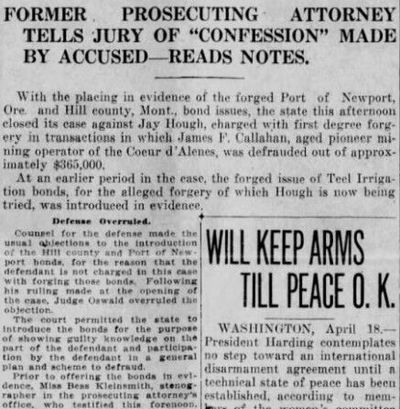This column reflects the opinion of the writer. Learn about the differences between a news story and an opinion column.
100 years ago in the Inland Northwest: More details emerged in a fraud case that ended with one defendant dead and the other on trial

The prosecution rested in the Jay Hough fraud case, and for the first time, details of Hough’s confession were made public.
On a night in January, Hough admitted that the firm of Milholland & Hough had obtained between $200,000 and $400,000 from Kellogg mining man John Callahan through forged bonds. Then they had lost all of Callahan’s money through stock speculation.
Hough also said that once the scheme unraveled, he and Milholland had agreed to commit suicide together in their offices in the Sherwood Building.
Yet Hough was talked out of that plan by his attorney, who told him he should “face the music.” Hough then surrendered himself to police.
After Hough’s confession, police arrived at Milholland’s house, where Milholland took his life in an upstairs room.
Hough’s attorneys were making a case that Hough had been forced into participating in the scheme by Milholland, who had repeatedly threatened Hough’s life.
From the murder beat: Robert Rosenbluth, former Army captain, denied any part in the murder of Major Alexander Cronkhite at Camp Lewis (Fort Lewis).
Sgt. Roland P. Pothier alleged that Rosenbluth ordered him to shoot Major Cronkhite because he wanted to “get him out of the way.”
But Rosenbluth said he played no part in the shooting and that prosecutors were just looking for a scapegoat.
He also said added Cronkhite was “the best-liked man in the outfit.”